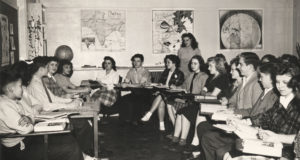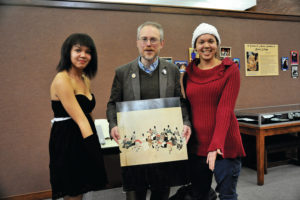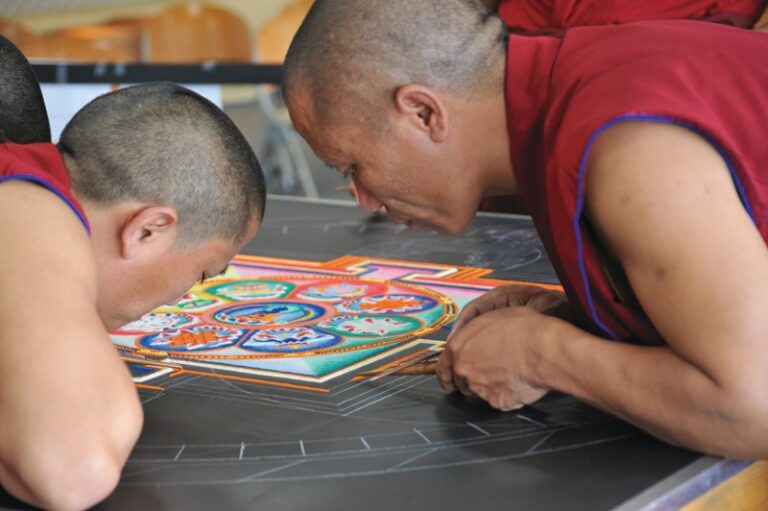Asian Studies Celebrates its 15th Anniversary
The Asian Studies program has long been active in organizing educational and entertaining events on campus, including its regular Asian Studies Colloquium series that brings experts on Asia to campus every month from September through April. However, during the 2013-14 academic year, in celebration of the program’s 15th anniversary, the entire college community was treated to a wide variety of presentations and exhibits exploring Asian cultures and Berea’s connection to the region.
The college has had relationships with Asia since as early as the 1930s due to President Francis Hutchins’ intimate connection with China. This was continued by Berea’s admission of Japanese-American students during the Second World War and its relationship with the Korean Induk University in the 1960s, founded as “Berea in Korea” by Korean-American author and educator Induk Pahk. Berea’s interest in Asia has also resulted in its participation in the sister region relationship between Madison County and Japan’s Yatsugatake region in addition to the agreement with the Tibetan government to enroll Tibetan students at Berea, beginning in the early 1990s. In spite of this profound relationship, the Asian Studies program was not conceived until 1997, when Dr. Robert Foster, Professor of History and Asian Studies, came to the college and, with the support of then-Dean John Bolin, actively promoted the academic study of Asian cultures. In 1999, the program was officially launched as a cooperative venture that combined resources found in other programs such as history, religion and art history.
Dr. Jeff Richey, Associate Professor of Religion and Asian Studies and current chair of the program, sees the events planned for the 15th anniversary celebration as developing this theme of Berea’s many connections to Asia over time. “I want people to look at these events as a reminder of the past, an appreciation of the present, and an anticipation of the future effects of Asia both on Berea and the world,” he says.

During the 2013-14 academic year, Phelps Stokes Chapel hosted two Stephenson Memorial Concerts related to Asia. In November, Fubuki Daiko, a traditional Japanese taiko (drums) troupe, came to campus. Consisting of five musicians of varied ancestries that stretch across the world from Japan and China to Scotland and Canada, Fubuki Daiko’s diverse membership signifies the current internationalized state of Asian cultures. The concert presented the troupe’s compositions, which utilized traditional Japanese percussion, flutes, and vocals. During their stay, Fubuki Daiko also offered drumming workshops for interested students and faculty.
April saw the second Asia-related concert, which featured Tibetan Buddhist monks from Drepung Loseling, an important cultural institution that was founded in Tibet in 1416 but relocated to India after the events of 1959 that also led to the current Dalai Lama’s exile. According to Jeff, this collaborative effort between the Asian Studies program and the Convocation series was successful on multiple levels. He cites the monks’ spectacular performance of traditional Tibetan music, dance, and debate and their “systematic construction of a sand mandala in the Alumni Building.” Such mandalas are intricate and beautiful but also temporary; both their construction and their destruction are highly ritualized processes that are intended to promote awareness of the impermanence and interdependence of all beings. But for Richey, the most profound interactions they had were with the Tibetan student community at the college and those with a Buddhist background. “Because of the unique political and cultural situation of Tibetan people, the opportunity for our students who come from Tibetan backgrounds to have very simple ordinary interactions with these monks who represent their cultural and spiritual traditions was wonderful, and it was always nice to see the glow on the faces of our Tibetan students as they interacted with these monks.”
The Asian Studies program also partnered with the Center for International Education (CIE)’s Think Global, It’s Friday (TGIF), a weekly luncheon program in which students and faculty present about their experiences abroad. Every year, TGIF focuses on a certain part of the world, with the 2013-14 academic year’s focus being East Asia. Hence, among presentations about other non-Asian countries, TGIF hosted talks about Japan, the Koreas, Syria, Malaysia, the Philippines, Tibet, India, Viet Nam, and Taiwan. Dr. Thomas Ahrens, the CIE Program Associate who directed the TGIF series during the 2013-14 academic year, notes that TGIF presentations are usually led by students who come from the specific countries or who have had the opportunity to study abroad. Because of Berea’s multiple connections to Asia through both international students and education abroad, it was not difficult to organize a rich and varied program of TGIF talks focused on East Asia.
Richey notes that one great advantage of the student presentations is the enhanced dialogue that they facilitate: “I think it is great for our students to hear each other talk about either places they visited or places from which they come, because it sometimes is easier for a student to relate more to what other students say than what a professor says.”
In addition to the student presentations, Dr. Libby Falk Jones, Professor of English, presented a set of photographs under the title “Seeing Mindfully: Photography Through an East Asian Lens.” These photographs were based on her studies in Hawai’i during the summer of 2012 as a participant in the East-West Center’s Institute on “Infusing East Asian Studies into the Undergraduate Curriculum.” The presentation featured around ninety of her photographs interspersed with passages from the ancient Chinese text known as the Laozi (Lao-tzu) or Daodejing (Tao Te Ching) and haiku (traditional Japanese seventeen-syllable poems) by Japanese poets Bashõ, Buson, and Issa. “The goal of the presentation was to invite viewers to enter into a contemplative experience of silent perception. The images and words were designed to explore ideas of receptivity, discovery, discipline, dynamism, perspective, and mystery—concepts that are central to East Asian art and thought,” explains Jones.
Asian content also enriched the CIE’s Mundo (Spanish, meaning “World”) Mondays—a regular series of presentations about world culture. Because presentations in this series (unlike TGIF) “are mainly focused on academics, we typically invite faculty members, guest speakers or performers for those events,” says Ahrens.
This year’s Mundo Mondays included presentations by college faculty members Dr. Gordon Gray and Dr. Ashley Elston, who dealt with “Modern Japanese Cinema” and “Picturing the Invisible in Buddhist Art of East Asia” respectively. Other Asia-related presentations featured guest speakers Dr. Tsun-Hui Hung from the University of Cincinnati, who played the erhu, a Chinese stringed instrument, and Professor Takeshi Moro from Santa Clara University, who presented photographic works about “Art and Reconciliation” inspired by his identity as a person of Japanese descent raised outside of Japan.

Thanks to the Art and Art History program, two exhibits of Asian art were on display in the campus galleries during the anniversary year. The Asian Studies program also hosted a reception in partnership with Hutchins Library’s spring 2014 exhibit of books and photographs celebrating the program and Berea’s connections to Asia. The reception was attended by students, faculty, alumni, and guest speakers such as President Lyle Roelofs, Dr. Chad Berry, Dean and Academic Vice President, and Dr. John Bolin, Dean Emeritus. Alumnus Darlene Smith, ’12 (who studied in China while she was a Berea student and later taught English there) and current Asian Studies major Amber Welch, ’14 (who completed a year of study at Japan’s Kyushuū University as part of her Berea education) also spoke at the event.


